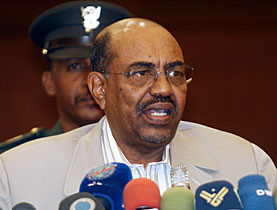
Strong states hurt international institutions

Ten years ago, the rise in power of international justice rattled the impunity of the world's dictators, but realpolitik has left institutions constrained.
That confidence has been broken by the return of state force, Pierre Hazan, a Geneva-based specialist in international justice, tells swissinfo.
In 1998, when 120 states adopted the Rome Statute of the International Criminal Court (ICC), the days of the dictator seemed numbered.
The International Criminal Tribunal for the former Yugoslavia indicted the Serbian leader Slobodan Milosevic, Britain arrested former Chilean dictator Augusto Pinochet and Belgium adopted a law of universal jurisdiction that covered tyrants and their accomplices while in power or in retirement.
But times have changed, says Hazan, author of “Judge War, Judge History” (Juger la guerre, juger l’Histoire), a book on international justice published by University Presses of France.
swissinfo: With the ICC’s desire to arrest Omar al-Bashir, the Sudanese president, is this the court’s moment of truth?
Pierre Hazan: It’s in any case the first time that the ICC prosecutor has been keen to indict a sitting president, a trial that set off a diplomatic shockwave.
It’s necessary in fact to know that Sudan has not signed the United Nations treaty that founded the ICC. It’s on the request of France and Britain that the UN Security Council transmitted the Darfur dossier to the ICC.
After that, the members of the Arab League and the African Union expressed reluctance. But more surprisingly, the trial’s instigator, France, envisages now resorting to a possibility written in the ICC statutes to suspend the court’s action in this case – and this in the name of looking for peace in Sudan.
swissinfo: In this situation, is it emblematic of the difficulties facing the ICC?
P.H.: At the end of the 1990s, it seemed that the law was going to play a determining role in international relations – an all-powerful law that materialised with the ICC.
But today, we have a very different context. We are seeing a strong resurgence of states in foreign policy to the detriment of multilateral institutions. International law is largely contested, including the Geneva Conventions.
More than before, states consider international law a legal arm they can use to further their interests at the time. It’s particularly true with the Sudanese case.
swissinfo: Is the ICC lacking legitimacy?
P.H.: It was only lacking it for some years, while the statutes of the ICC were adopted by more than 60 countries [the threshold needed for them to be put into effect]. The success that no one would have believed possible has quickly fed a strong mobilisation in civil society in the north as in the south.
But at the same time, the September 11 attacks provoked a split and a new international configuration, unfavourable to the development of an independent international justice.
swissinfo: Is the ICC the best instrument anyway for ending dictatorial impunity?
P.H.: The ICC doesn’t have such power. Since it can’t intervene in every country, the number of dictators remains rather large. The means of the court are limited. Its effectiveness is equally hindered by the absence of an international police at its disposal. The ICC depends on the countries involved. It wouldn’t be able to arrest indicted parties, much less heads of state, political leaders or military.
This throws back the utopia that surrounded the creation of this court – the all-powerful law. This waiting for public opinion, civil society and victims seems completely disproportionate right now.
swissinfo: Can the ICC indict any dictator or only those who have committed mass killings?
P.H.: The court’s domain is in regard to those charged with war crimes, crimes against humanity and genocide. Calling someone a dictator per se isn’t sufficient for the ICC to intervene.
swissinfo: Can the ICC eventually free itself of state guardianship?
P.H.: It would be necessary for the court to demonstrate the legitimacy of its actions to the concerned parties.
The ICC, which is based in The Hague, must create a link and prove its methodology in regard to populations plunged in war and misery and who find themselves thousands of kilometres from the Netherlands. This link is extremely complicated to for a legal bureaucracy in a northern country to establish.
swissinfo-interview: Frédéric Burnand in Geneva
Experts say that the decision to indict Sudanese President Omar al-Bashir will cause diplomatic problems.
They say it will hinder the establishment of an international peacekeeping force in Darfur and a political settlement to the crisis.
ICC Chief Prosecutor Luis Moreno-Ocampo has been accused of grandstanding in issuing the charges against al-Bashir, a move to which the Sudanese government has taken exception.
The ICC, on the other hand, says it was established to pursue a mandate independent of political or diplomatic considerations.
But in issuing a warrant for al-Bashir, the court, which relies on state actors to enforce its directives, will have few if any takers.
The legal basis for the International Criminal Court comes from the Statute of Rome, which entered into force on July 1, 2002.
The ICC is capable of trying accused persons of the most serious crimes that affect the international community and deeply wound the human consciousness, be it genocide, crimes against humanity or war crimes.
The court intervenes only when national legal authorities are incapable or don’t have the will to prosecute the crimes.
No official immunity, even by heads of state or government, can be invoked to avoid prosecution by this court.
The Swiss government supports the ICC and believes it represents a major advancement in the fight against impunity as well as the promotion and respect of humanitarian rights.

In compliance with the JTI standards
More: SWI swissinfo.ch certified by the Journalism Trust Initiative































You can find an overview of ongoing debates with our journalists here . Please join us!
If you want to start a conversation about a topic raised in this article or want to report factual errors, email us at english@swissinfo.ch.